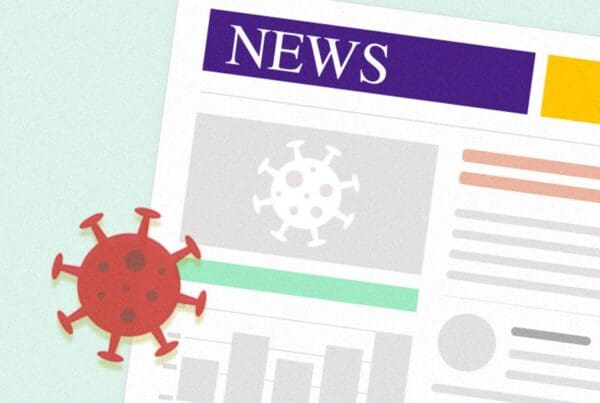The Omicron coronavirus variant (B.1.1.529) has resulted in an astonishing increase in COVID-19 cases with a greater than 100% increase over the last 7 days. In less than a month, it has gone from being undetectable to accounting for approximately 75% of all cases nationally. The same trend is being observed locally by the UW Medicine Virology Lab.
Although we have fortunately not seen a dramatic increase in hospitalizations at UW Medicine so far, this extremely high rate of transmission is cause for great concern and will require increased vigilance to keep our providers, staff, and patients safe. We know what works: vaccination and boosters, physical distancing, ventilation and filtration, and staying home and getting tested with any symptoms. The one other tool we have is masking. Over the last two years, we have grown comfortable with universal masking in our day-to-day lives in the community and at work, adding yet another layer of safety, especially when everyone in an encounter is masked.
Given the rapid spread of Omicron and potential improvements in our mitigation layers, the UW Medicine Employee Health and Infection Prevention & Control teams are asking everyone to “level up” their masks. What does this mean?
- If you can wear a fit-tested N95 respirator while at work, you are encouraged to do so. This is especially important in congregate spaces like emergency departments where people’s COVID-19 status may be unknown. The Supply Chain team is working on stocking the different types of N95s to clinics and units. We recognize that these respirators can be very hard to wear for some people, especially for longer periods of time, but laboratory studies support their superior ability to block aerosol transmission in both directions (transmission and acquisition). You can wear a non-fit tested N95 if it is more comfortable and if a respirator is not required for a specific patient or unit.
- If you prefer using your own higher-level mask at work, such as a KN95 or KF94, you may do so. Please wear a UW Medicine medical/surgical mask over your own mask to ensure you are protected from splashes.
- If neither of the above options works for you, consider doubling up your medical mask or taking other steps to ensure a good fit, such as “knotting and tucking.”
- All patients should be masked when a healthcare worker or visitor is present unless there is a medical reason not to be. Public Health – Seattle & King County just published some additional, very helpful masking guidance that you can read here. We are working with Supply Chain to obtain other types of masks and respirators that may work better for some people. If we detect an increase in cases among healthcare workers linked to specific types of respiratory protection, we will act quickly and accordingly to different recommendations.
In addition to these new masking recommendations at work, I encourage you to observe as many precautions as possible in the community. Please limit your exposure to people whose vaccination status is unknown and wear a well-fitting mask in all public settings when physical distancing cannot be maintained. If you or a member of your household develop symptoms, please get tested as soon as possible. We are working on improving access to testing for employees and your families and will update you.
The risk of exposure to Omicron also makes it more important than ever to get a COVID-19 booster if you are eligible. All people over age 16 who completed their Pfizer or Moderna vaccine series more than six months ago or who received a Johnson & Johnson vaccine more than two months ago should get a booster shot. You may sign up for a booster dose at c19-vaccine.uwmedicine.org.
Finally, while initial reports still indicate that a full series of vaccinations and boosters limits the risk of serious illness from Omicron, even mild cases of COVID-19 pose risks for our health system by forcing us to stay at home. Especially at this time of constraints on hospital capacity, we need to take every precaution possible to stay healthy.
Although this is not the news I hoped to share this week, I believe that we can still safely connect with our loved ones for the holidays when we are vaccinated, boosted and careful. A colleague of mine, Dr. Audrey Young, recently shared with me a philosophical perspective on the idea of optimism. Optimism is not simply a happy emotion or hoping for a good outcome. It is the belief that a good outcome is likely because we are prepared to make that outcome happen. I believe that we have prepared and continue to prepare for a good outcome to the ongoing challenge of the pandemic. I remain optimistic.
Thank you once again for rising to each new challenge of the COVID-19 pandemic!
Sincerely,
John Lynch, MD, MPH
Medical Director, Infection Prevention & Control
Associate Medical Director, Harborview Medical Center
Division of Allergy & Infectious Diseases, UW School of Medicine
